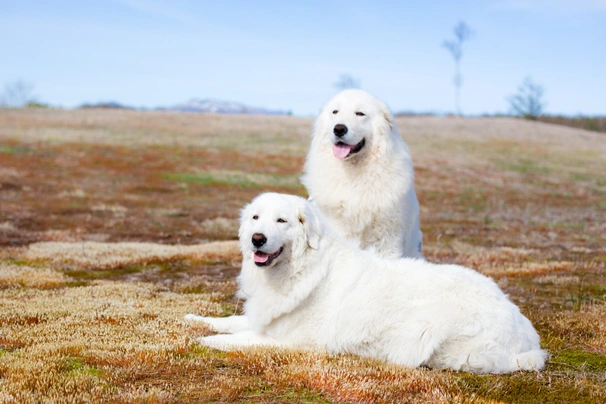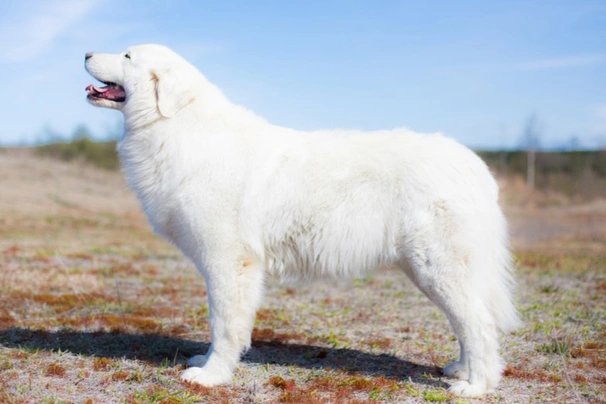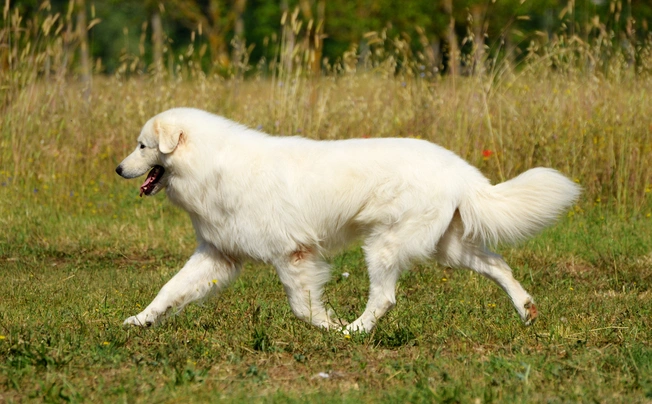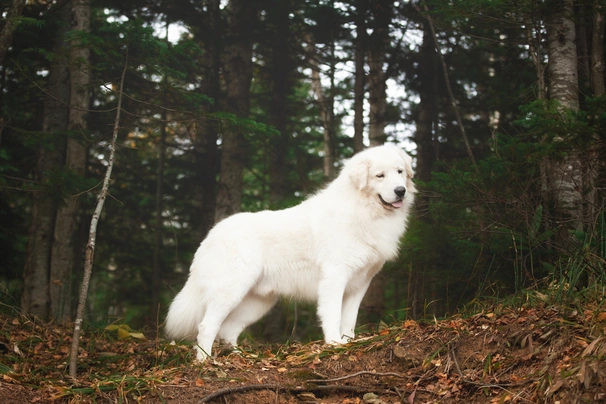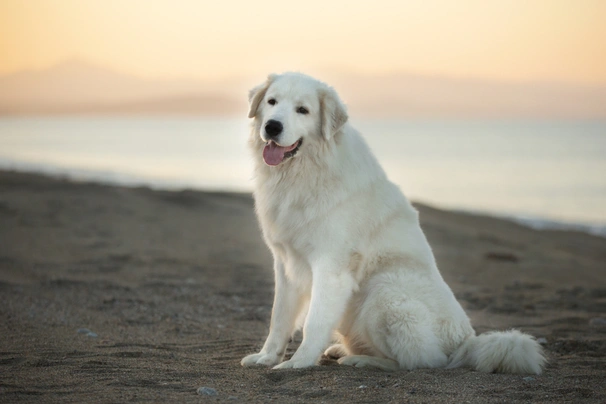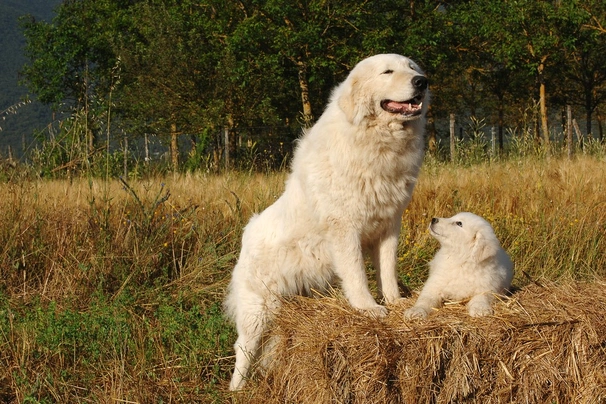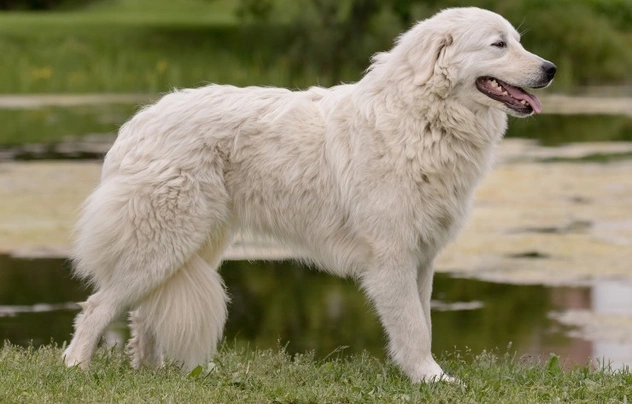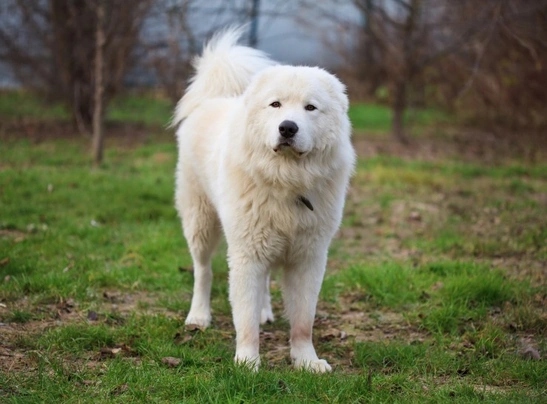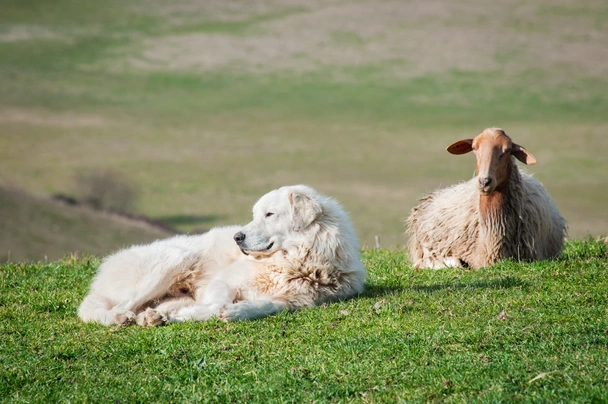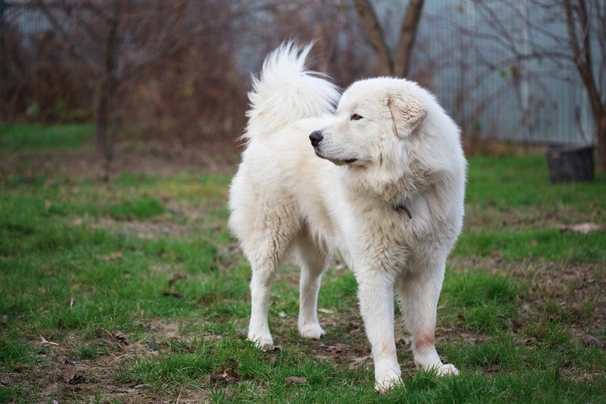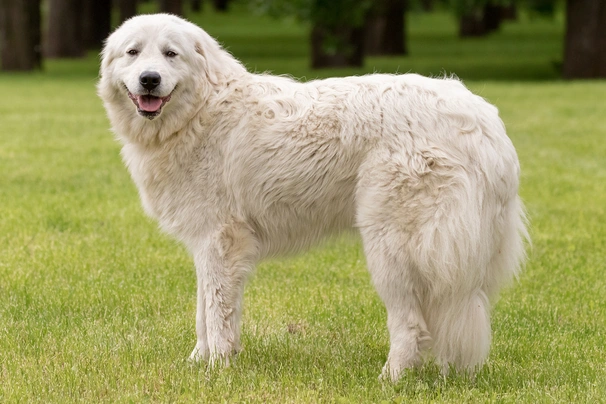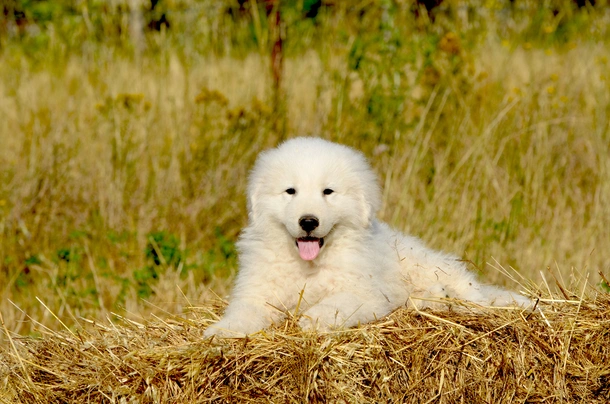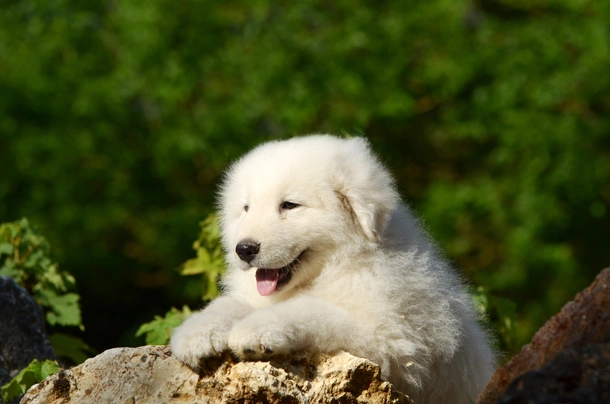Maremma Sheepdog
Pros
Cons
Introduction of the Maremma Sheepdog
The Maremma is a highly intelligent dog and one that forms extremely strong bonds with their owners. They have always been highly prized for their herding abilities in their native Italy but they are also known to be kind and gentle family pets and companions too. Maremmas are noble proud dogs that enjoy being part of the family and involved in everything that goes on around them which is why since they first appeared in the UK they have found their way into the hearts and homes of many people. However anyone wishing to share their home with a Maremma would need to register their interest with breeders because these handsome dogs remain quite rare.
History of the Maremma Sheepdog
The exact origins of the Maremma Sheepdog are a bit of a mystery but what is known is that these majestic dogs have been used by shepherds in Italy for centuries. Some people think they are the descendants of white dogs that were around at the time of the Magyars. Other people think that at one time two there were two types of dog namely the Maremmano and the Abruzzese with the latter dog being longer in the body and used in the more mountainous regions of the country. It was not until the 1950s that the two were officially recognised as one breed and given the name Maremmano-Abruzzese.
The Maremmano-Abruzzese is thought to be a descendant of white sheepdogs seen in Eastern Europe two thousand years ago. The Maremma however evolved to be that much smaller than other sheepdogs that were around at the time but they retained their strong independent herding instincts and their aloofness. These noble dogs are still highly prized in Italy for their herding skills and although the first Maremma arrived British shores way back in 1872 they remain quite rare in the UK.
Interesting facts about the breed
- Is the Maremma Sheepdog a vulnerable breed? Yes they are very rarely seen in the UK and as such well-bred Kennel Club registered puppies can command a lot of money. They are also quite rare in their native Italy where they are still highly prized working dogs
- Maremmas are known to be very “clean” dogs and generally don’t have a “doggy” smell about them except when their coats get wet
- Maremmas are often left to guard flocks by themselves in Italy without the need of a shepherd being present and has a deep instinct to watch over their charges which is an instinct that is deeply embedded in their psyche even in a home environment
- Some female Maremmas generally don’t get on well together when living in the same environment
- A Maremma puppy when 10-months old can weigh up to 45 kg
- Unlike watchdog breeds like Rottweilers and Dobermans the Maremma does not need to be trained to protect and guard because they make decisions without the need of any sort of human intervention
- In the United States the Maremma Sheepdog Club does not recommend the breed being kept as a pet
Appearance of the Maremma Sheepdog
Height at the withers: Males 65 - 73 cm Females 60 - 68 cm
Average weight: Males 35 - 45 kg Females 30 - 40 kg
The Maremma is a large and majestic looking dog that boasts having a bear-like head. However although massive Maremmas are surprising light on their feet. They have quite conical shaped heads that are large in relation to the rest of their bodies. Their skulls are wide between a dog's ear but narrower at the foreface. They have a medium stop and the area under a dog's eyes is nicely chiselled. They have powerful muzzles and jaws with tight fitting lips. A Maremma's nose is black and their eyes are dark being a good size neither small or large and almond shaped with black rims.
They have small V-shaped ears in relation to their heads which are set high which are covered in short hair. A dog's ears lie flat to the side of their head only moving forward when they are alert or excited. The tip of a dog's ear goes to a point and should never be rounded. They have a perfect scissor bite where the upper teeth neatly overlap their lower ones.
They have strong moderately long necks without any sign of a dewlap and their forequarters are powerful. Shoulders are well muscled sloping and long with a dog's front legs being muscular and showing a good amount of bone without being too heavy. Maremmas have strong well developed and muscular bodies with their withers being slightly higher than their backs which are broad and straight before rising to a gentle arch over a dog's loins. Rumps are broad and strong. They have full ribcages that let down well to a dog's elbow. Sternums are long before they gradually curve up to the abdomen which adds to a Maremma's athletic look.
Hindquarters are powerful and wide with dogs having well-muscled back legs. Their feet are almost round and large with a dog's back feet being a little more oval-shaped than their front ones. Tails are set low which dogs carry level to their backs and gently curved at the tip when alert but down when relaxed. Their tails are well covered in hair but without any fringes.
When it comes to their coat the Maremma Sheepdog boasts having a thick harsh slightly wavy coat that forms a dense collar around their necks. The hair on a dog's muzzle head ears feet and front legs are is short but they do have a little feathering on their back legs. They have a very dense close lying undercoat which tends to be thicker during the colder winter months than in the summertime. The only acceptable colour for Kennel Club registration is as follows:
- White
It is worth noting that the accepted breed colours for Kennel Club registration can differ from those set out in the breed standard which are as follows:
- All white with a bit of ivory shading or pale fawn being permissible
Gait/movement
When a Maremma Sheepdog moves they do so with a free and active gait always giving the impression of being light and nimble on their feet. For such large dogs they move easily being able to turn quickly when needed.
Faults
The Kennel Club frowns on any exaggerations or departures from the breed standard and would judge the faults on how much they affect a dog's overall health and wellbeing as well as their ability to perform.
Males should have both testicles fully descended into their scrotums and it is worth noting that a dog can be a little lighter or heavier as well as slightly taller or shorter than set out in the Kennel Club breed standard which is only given as a guideline.
Temperament of the Maremma Sheepdog
The Maremma Sheepdog is known to be a gentle giant and one that thrives in a home environment. They are good around children of all ages but care has to be taken when they are around toddlers simply because of their size and because when young playtime can get a little boisterous. They form strong bonds with their families and love to be involved in things that go on around them. They are however quite independent by nature often seeming quite aloof. As such the Maremma is not the best choice for first time owners and are better suited to people who are familiar with the needs of this type of large herding dog.
They are also known to be extremely protective of their families and their property which in short means they are good watch dogs only barking when necessary and when they perceive any danger. They are reserved and extremely wary around people they don't know but once they get to know a person they are generally alright and will accept their presence bearing in mind that a Maremma will decide if a person is to be trusted or not. It's extremely important for these dogs to be well socialised from a young age so they grow up to be confident well-balanced mature dogs. Their socialisation has to include introducing them to lots of new situations noises people other animals and dogs once they have been fully vaccinated.
It's also crucial for their training to start early too and it must be consistent throughout a dog's life. A Maremma is never happier than when they know their place in the pack and who they can look to for direction and guidance. If they don't know who the alpha dog is in a household they may quickly take on the role of dominant dog which can make them harder to live with and handle which is why they are not the best choice for novice dog owners. They are however ideally suited to people who live in a rural environment and who lead active outdoor lives.
Are they a good choice for first time owners?
Maremma Sheepdogs are not a good choice for first time dog owners because they must be socialised handled and trained by people who are familiar with the needs of such a large independent thinking dog that was bred to guard livestock. A Maremma could quickly get the better of a novice owner and start to show a more dominant side to their character making them harder to handle and live with.
What about prey drive?
Maremmas are known to be good around animals which includes livestock birds and other animals. As such they do not typically have a high prey drive. With this said care should always be taken when a Maremma meets a new animal for the first time bearing in mind that it is in the breed’s psyche to chase off any animal they deem dangerous that dares trespass on their property
What about playfulness?
Maremmas have a very playful side to their natures more especially when young but as they mature they take a more serious outlook on life which is to keep an eye on their families and their property.
What about adaptability?
Maremmas are better suited to households with well-fenced secure back gardens that a dog can safely roam in whenever possible to really let off steam and to prevent boredom from setting in.
What about separation anxiety?
Maremmas are independent dogs and even though they form strong ties with their families they are not generally known to suffer from separation anxiety providing they are never left to their own devices for long periods of time. Any dog that finds themselves on their own for a long time could develop some unwanted destructive behavioural issues which includes incessant barking.
What about excessive barking?
The need to bark is a trait that is deeply embedded in a Maremma’s psyche having been bred to guard livestock from predators and poachers. With this said a Maremma only barks for good reason which is typically because something they don’t like is going on around them.
Do Maremma Sheepdogs like water?
Most Maremmas like swimming and will take to the water whenever they can more especially when the weather is hot. However if anyone who owns a dog that does not like water should never force them to go in because it would just end up scaring them. With this said care should always be taken when walking a Maremma off the lead anywhere near more dangerous watercourses just in case a dog decides to leap in and then needs rescuing because they cannot get out of the water on their own.
Are Maremma Sheepdogs good watchdogs?
Maremmas are very effective natural watchdogs and therefore they do not need to be trained to guard and protect. Their size alone is enough to put most wrongdoers off but the fact they will stand their ground and not let anyone passed means that nobody would normally even try. Maremmas like to stay on the boundary of a property so they can keep an eye on things. They rarely show any sort of aggression towards strangers unless they are provoked that is.
Intelligence / Trainability of the Maremma Sheepdog
The Maremma is an extremely smart dog and a fast learner. The downside to this is they are just as quick to pick up bad habits as they are the good. As such their training has to begin early and it has to be consistent and always fair throughout a dog’s life so they understand what's expected of them. They need to be handled with a firm yet fair hand or they might to take on the role of dominant dog which is why they are best suited to people who are familiar with this type of working dog bearing in mind that no owner should expect that their Maremma would show the same sort of obedience they may get from other breeds because they like to “think” about a command before obeying it.
The key to successfully training a Maremma Sheepdog is to make things as interesting as possible and to avoid too much repetition. It's also a good idea to keep training sessions short which helps dogs stay more focussed on what it’s being asked of them bearing in mind that the more intelligent a dog is the faster they get bored bearing in mind that Maremmas are extremely smart dogs and that they are independent characters by nature which can make training them challenging.
They do not answer well to harsh correction or any sort of heavy handed training methods but they do respond extremely well to positive reinforcement which always brings the best out of these intelligent and quick-witted dogs especially when there are high value rewards involved in a training session.
Like all puppies Maremmas are incredibly cute when young and it is all too easy to spoil them when they first arrive in new homes. As soon as a puppy is nicely settled owners must start out as they mean to go on by laying down ground rules and boundaries so that a Vallhund puppy understands what is expected of them. It helps establish a pecking order and who the alpha dog is in the household. The first commands a puppy should be taught are as follows:
- Come
- Sit
- Stay
- Heel
- Quiet
- Leave it
- Down
- Bed
Children and other
Maremmas are known to be extremely good around babies and very young children thanks to their gentle placid natures although they are definitely not “gentle giants” like many other large breeds. However any interaction between toddlers and a dog should always be well supervised by an adult to make sure playtime stays nice and calm which is especially when dogs are still very young which is when they tend to be a little boisterous and thanks to their large size they could easily knock a smaller child over albeit by accident. Care has to be taken when the kids have friends over to play because Maremmas are very protective of their families and need to accept visiting children as being “friends”.
When dogs have been well socialised from a young enough age they generally get on well with other dogs they meet and if they have grown up with a family cat in a household they usually get on well together. However a Maremma might decide to chase off any other cats they encounter in their environment. They generally get on with other animals and smaller pets but it’s always advisable to keep an eye on dogs when they first encounter any smaller pets.
Health of the Maremma Sheepdog
The average life expectancy of a Maremma Sheepdog is between 10 and 13 years when properly cared for and fed an appropriate good quality diet to suit their ages.
The Maremma is known to be a healthy breed however they are known to suffer from the following hereditary health issues which are worth knowing about when planning to share a home with one of these handsome dogs:
- Hip dysplasia - breeders should have stud dogs hip scored through the BVA/KC hip dysplasia scheme
- Elbow dysplasia - breeders should have stud dogs tested
- Eye disorders – dogs should be eye tested
- Sensitivity to anaesthetic
- Bloat/gastric torsion
It is worth noting that thanks to a Maremmas thick coat care should be taken when using flea and tick sprays which could result in an excessive build-up in a dog’s heavy coat.
What about vaccinations?
Maremma puppies would have been given their initial vaccinations before being sold but it is up to their new owners to make sure they have their follow-up shots in a timely manner with the vaccination schedule for puppies being as follows:
- 10 -12 weeks old bearing in mind that a puppy would not have full protection straight away but would be fully protected 2 weeks after they have had their second vaccination
There has been a lot of discussion about the need for dogs to have boosters. As such it's best to talk to a vet before making a final decision on whether a dog should continue to have annual vaccinations which are known as boosters.
What about spaying and neutering?
A lot of vets these days recommend waiting until dogs are slightly older before spaying and neutering them which means they are more mature before undergoing the procedures. As such they advise neutering males and spaying females when they are between the ages of 6 to 9 months old and sometimes even when a dog is 12 months old.
Other vets recommend spaying and neutering dogs when they are 6 months old but never any earlier unless for medical reasons. With this said many breeds are different and it is always advisable to discuss things with a vet and then follow their advice on when a dog should be spayed or neutered.
What about obesity problems?
Like all other breeds some Maremmas gain weight after they have been spayed or neutered and it's important to keep an eye on a dog's waistline just in case they do. If a dog starts to put on weight it's important to adjust their daily calorie intake and to up the amount of exercise they are given. Older dogs too are more prone to gaining weight and again it's essential they be fed and exercised accordingly because obesity can shorten a dog's life by several years. The reason being that it puts a lot of extra strain on a dog's internal organs including the heart which could prove fatal.
What about allergies?
Maremmas are not typically known to suffer from allergies but it's important for a dog to see a vet sooner rather than later if one flares up. Allergies can be notoriously hard to clear up and finding the triggers can be challenging. With this said a vet would be able to make a dog with an allergy more comfortable while they try to find out the triggers which could include the following:
- Certain dog foods that contain high levels of grains and other cereal-type fillers
- Airborne pollens
- Dust mites
- Environment
- Flea and tick bites
- Chemicals found in everyday household cleaning products
Participating in health schemes
All responsible Maremma Sheepdog breeders would ensure that their stud dogs are tested for known hereditary and congenital health issues known to affect the breed by using the following schemes:
- BVA/KC Hip Dysplasia Scheme
- Elbow dysplasia – dogs should be tested by a registered BVA vet
What about breed specific breeding restrictions?
Apart from the standard breeding restrictions that are in place for all Kennel Club registered breeds there are no other breed specific breeding restrictions in place for the Maremma Sheepdog.
What about Assured Breeder Requirements?
It is mandatory for all Kennel Club Assured Breeders to use the following test on their dogs and all other breeders are strongly advised to follow suit:
Caring for the Maremma Sheepdog
Maremmas need to be groomed on a regular basis to make sure their coats and skin are kept in top condition. They also need to be given regular daily exercise to ensure they remain fit and healthy. On top of this dogs need to be fed good quality food that meets all their nutritional needs throughout their lives.
Caring for a Maremma Sheepdog puppy
Maremma puppies are boisterous and full of life which means it's essential for homes and gardens to be puppy-proofed well in advance of their arrival. A responsible breeder would have well socialised their puppies which always leads to more outgoing confident and friendly dogs right from the word go. With this said any puppy is going to feel vulnerable when they leave their mother and littermates which must be taken into account. The longer a puppy can remain with their mother the better although it should never be for too long either.
It's best to pick a puppy up when people are going to be around for the first week or so which is the time needed for a puppy to settle in. Puppy-proofing the home and garden means putting away any tools and other implements that a boisterous puppy might injure themselves on. Electric wires and cables must be put out of their reach because puppies love chewing on things. Toxic plants should be removed from flowerbeds and the home too.
Puppies need to sleep a lot to grow and develop as they should which means setting up a quiet area that's not too out of the way means they can retreat to it when they want to nap and it's important not to disturb them when they are sleeping. It's also a good idea to keep "playtime" nice and calm inside the house and to have a more active "playtime" outside in the garden which means puppies quickly learn to be less boisterous when they are inside.
The documentation a breeder provides for a puppy must have all the details of their worming date and the product used as well as the information relating to their microchip. It is essential for puppies to be wormed again keeping to a schedule which is as follows:
- Puppies should be wormed at 6 months old
- They need to be wormed again when they are 8 months old
- Puppies should be wormed when they are 10 months old
- They need to be wormed when they are 12 months old
Things you'll need for your puppy
There are certain items that new owners need to already have in the home prior to bringing a new puppy home. It's often a good idea to restrict how much space a puppy plays in more especially when you can't keep an eye on what they get up to bearing in mind that puppies are often quite boisterous which means investing in puppy gates or a large enough playpen that allows a puppy the room to express themselves while keeping them safe too. The items needed are therefore as follows:
- Good quality puppy or baby gates to fit on doors
- A good well-made playpen that's large enough for a puppy to play in so they can really express themselves as puppies like to do
- Lots of well-made toys which must include good quality chews suitable for puppies to gnaw on bearing in mind that a puppy will start teething anything from when they are 3 to 8 months old
- Good quality feed and water bowls which ideally should be ceramic rather than plastic or metal
- A grooming glove
- A slicker brush or soft bristle brush
- Dog specific toothpaste and a toothbrush
- Scissors with rounded ends
- Nail clippers
- Puppy shampoo and conditioner which must be specifically formulated for use on dogs
- A well-made dog collar or harness
- A couple of strong dog leads
- A well-made dog bed that's not too small or too big
- A well-made dog crate for use in the car and in the home that's large enough for a puppy to move around in
- Baby blankets to put in your puppy's crate and in their beds for when they want to nap or go to sleep at night
Keeping the noise down
All puppies are sensitive to noise including Maremma puppies. It's important to keep the noise levels down when a new puppy arrives in the home. TVs and music should not be played too loud which could end up stressing a small puppy out resulting in them being withdrawn timid and shy.
Keeping vet appointments
As previously mentioned Maremma puppies would have been given their first vaccinations by the breeders but they must have their follow up shots which is up to their new owners to organise. The vaccination schedule for puppies is as follows:
- 10 -12 weeks old bearing in mind that a puppy would not have full protection straight away but would only be fully protected 2 weeks after they have had their second vaccination
When it comes to boosters it's best to discuss these with a vet because there is a lot of debate about whether a dog really needs them after a certain time. However if a dog ever needed to go into kennels their vaccinations would need to be fully up to date.
What about older Maremma Sheepdogs when they reach their senior years?
Older Maremmas need lots of special care because as they reach their golden years they are more at risk of developing certain health concerns. Physically a dog's muzzle may start to go grey but there will be other noticeable changes too which includes the following:
- Coats become coarser
- A loss of muscle tone
- They can either become overweight or underweight
- They have reduced strength and stamina
- Older dogs have difficulty regulating their body temperature
- They often develop arthritis
- Immune systems do not work as efficiently as they once did which means dogs are more susceptible to infections
- Older dogs change mentally too which means their response time tends to be slower as such they develop the following:
- They respond less to external stimuli due to impaired vision or hearing
- They tend to be a little pickier about their food
- They have a lower pain threshold
- Become intolerant of any change
- Often an older dog can feel disorientated
Living with a Maremma Sheepdog in their golden years means taking on a few more responsibilities but these are easily managed and should include looking at their diet the amount of exercise they are given how often their dog beds need changing and keeping an eye on the condition of their teeth.
Older Maremmas need to be fed a good quality diet that meets their needs at this stage of their lives all the while keeping a close eye on a dog's weight. A rough feeding guide for older dogs is as follows bearing in mind they should be fed highly digestible food that does not contain any additives:
- Protein content should be anything from 14 – 21%
- Fat content should be less than 10%
- Fibre content should be less than 4%
- Calcium content should be 0.5 – 0.8%
- Phosphorous content should be 0.4 – 0.7%
- Sodium content should be 0.2 – 0.4%
Older Maremmas don't need the same amount of daily exercise as a younger dog but they still need the right amount of physical activity to maintain muscle tone and to prevent a dog from putting on too much weight. All dogs need access to fresh clean water and this is especially true of older dogs when they reach their golden years because they are more at risk of developing kidney disorders.
Grooming of the Maremma Sheepdog
The Maremma boasts having a very thick harsh outercoat and a much denser and soft undercoat. As such they are medium maintenance on the grooming front. A twice weekly brush is needed to remove any dead and loose hair and to prevent any knots and tangles from forming. They shed steadily throughout the year only more so during the Spring and then again in the Autumn when they tend to shed quite heavily which is when more frequent grooming is usually necessary to stay on top of things and to remove dead and shed hair from a dog's coat.
It's also important to check a dog's ears on a regular basis and to clean them when necessary. If too much wax is allowed to build up it can lead to a painful infection which can be hard to clear up. In short prevention is often easier than cure with ear infections.
Exercise of the Maremma Sheepdog
The Maremma is an intelligent dog and need to be given the right amount of daily exercise and mental stimulation for them to be truly happy well-rounded dogs. They need at least 2 hour's exercise a day with as much off the lead time as possible but only in a safe environment. If they are not given the right amount of mental stimulation and exercise every day a Maremma would quickly get bored and could even begin to show some destructive behaviours around the home which is their way of relieving any stress they are feeling and not necessarily because they are being naughty.
A shorter walk in the morning would be fine but a longer more interesting one in the afternoon is a must with as much off the lead time as possible. These dogs also like to be able to roam around a back garden so they can really let off steam. However the fencing has to be extremely secure to keep these active high-energy dogs in because if they find a weakness in the fence they would soon escape and could get into all sorts of trouble.
With this said Maremma puppies should not be over exercised because their joints and bones are still growing. This includes not letting a dog jump up and down from furniture or going up or down the stairs. Too much pressure placed on their joints and spines at an early age could result in a dog developing serious and painful problems later in their lives.
Feeding of the Maremma Sheepdog
If you get a Maremma Sheepdog puppy from a breeder they would give you a feeding schedule and it's important to stick to the same routine feeding the same puppy food to avoid any tummy upsets. You can change a puppy's diet but this needs to be done very gradually always making sure they don't develop any digestive upsets and if they do it's best to put them back on their original diet and to discuss things with the vet before attempting to change it again.
Older dogs are not known to be fussy eaters but this does not mean they can be given a lower quality diet. It's best to feed a mature dog twice a day once in the morning and then again in the evening making sure it's good quality food that meets all their nutritional requirements. It's also important that dogs be given the right amount of exercise so they burn off any excess calories or they might gain too much weight which can lead to all sorts of health issues. Obesity can shorten a dog's life by several years so it's important to keep an eye on their waistline from the word go. Owners should pay special attention to the calcium/phosphorus ratio of a puppy’s feed making sure that it is 1.3: 1.
Feeding guide for a Maremma Sheepdog puppy
Puppies need to be fed a highly nutritious good quality diet for them to develop and grow as they should. As a rough guide a Maremma puppy can be fed the following amounts every day making sure their meals are evenly spread out throughout the day and it's best to feed them 3 or 4 times a day:
- 2 months old - 274g to 307g depending on puppy's build
- 3 months old - 344g to 403g depending on puppy's build
- 4 months old - 374g to 445g depending on puppy's build
- 5 months old - 413g to 527g depending on puppy's build
- 6 months old - 450g to 599g depending on puppy's build
- 7 months old - 450g to 600g depending on puppy's build
- 8 months old - 419g to 596g depending on puppy's build
- 9 months old - 391g to 556g depending on puppy's build
- 10 months old - 356g to 520g depending on puppy's build
- 11 months old - 323g to 475g depending on puppy's build
- 12 months old - 321g to 433g depending on puppy's build
- 13 months old - 320g to 430g depending on puppy's build
- 14 months old - 318g to 426g depending on puppy's build
Once a puppy is 15 months old they can be fed adult dog food.
Feeding guide for an adult Maremma Sheepdog
Once fully mature an adult Maremma Sheepdog should be fed a good quality diet to ensure their continued good health. As a rough guide an adult dog can be fed the following amounts every day:
- Dogs weighing 30 kg can be fed 322g to 424g depending on activity
- Dogs weighing 35 kg can be fed 337g to 443g depending on activity
- Dogs weighing 40 kg can be fed 381g to 501g depending on activity
- Dogs weighing 45 kg can be fed 409g to 538g depending on activity
Maremma Sheepdog price
If you are looking to buy a Maremma Sheepdog you would need to register your interest with breeders and agree to being put on a waiting list because very few puppies are bred every year. You would need to pay anything upwards of £500 for a well-bred pedigree Kennel Club registered puppy.
The cost of insuring a male 3-year-old Maremma in northern England would be £31.18 a month for basic cover but for a lifetime policy this would set you back £85.76 a month (quote as of April 2108). When insurance companies calculate a pet's premium they factor in several things which includes where you live in the UK a dog's age and whether or not they have been neutered or spayed among other things.
When it comes to food costs you need to buy the best quality food whether wet or dry making sure it suits the different stages of a dog’s life. This would set you back between £40 - £60 a month. On top of this you need to factor in veterinary costs if you want to share your home with a Maremma and this includes their initial vaccinations their annual boosters the cost of neutering or spaying a dog when the time is right and their yearly health checks all of which quickly adds up to over £1400 a year.
As a rough guide the average cost to keep and care for a Maremma Sheepdog would be between £80 to £150 a month depending on the level of insurance cover you opt to buy for your dog but this does not include the initial cost of buying a well-bred healthy Kennel Club registered pedigree Maremma Sheepdog puppy.
Buying advice
When visiting and buying any puppy or dog there are many important things to consider and questions to ask of the breeder/seller. You can read our generic puppy/dog advice here which includes making sure you see the puppy with its mother and to verify that the dog has been wormed and microchipped.
Maremma Sheepdogs are rarely seen in the UK although there breed numbers are slowly rising with more well-bred puppies being registered with the Kennel Club every year. Because they are rare puppies can often command a lot of money. As such with Maremmas there is specific advice questions and protocols to follow when buying a puppy which are as follows:
- There are many online and other adverts showing images of adorable Maremma Sheepdog puppies for sale. However the sellers ask buyers for money up front before agreeing to deliver a puppy to a new home. Potential buyers should never buy a puppy unseen and should never pay a deposit to a seller before collecting a puppy from them
- As previously touched upon finding well-bred Maremma Sheepdog puppies in the UK can prove challenging. As such some amateur breeders/people breed from a dam far too often so they can make a quick profit without caring for the welfare of the puppies their dam or the breed in general. Under Kennel Club rules a dam can only produce 4 litters and she must be between a certain age to do so. Anyone wishing to buy a Maremma Sheepdog puppy should think very carefully about who they purchase their puppy from and should always ask to see the relevant paperwork pertaining to a puppy's lineage their vaccinations and their microchipping
